ARCHIVE – Vancouver Island breaking news [Jan-Feb 2017]

Monday, February 27 ~ West side of Vancouver Island. BC NDP leader John Horgan will kick off his 2017 re-election campaign in his home riding of Langford-Juan de Fuca on Saturday March 11.
The big-crowd event will be held at the Langford Legion, 761 Station Avenue starting at 10:30am.
Horgan has held the Langford-area riding (by various electoral area names, including Sooke and up to Port Renfrew) since 2005. He has also built an NDP stronghold on Vancouver Island that has repeatedly proven for him to have a far-reaching and deep reach into many communities and economic sectors.
For this election, the reboundaried riding has lost the largely rural area of Metchosin. Ridings are rebalanced over the years based on population numbers. Both Langford and Sooke have seen population increases in recent years, due mainly to the relatively lower cost of housing on the west side of south Vancouver Island.
The BC provincial election is set for Tuesday, May 9.

Monday, February 27 ~ VICTORIA. BC Green Party Leader Andrew Weaver, MLA (Oak Bay – Gordon Head) will be out campaigning in his riding on Saturday, March 4.
Ahead of that, this week he’ll be attending an all-candidates listening session on March 2 in Victoria. Then to Vancouver on March 3 to take part in a senior executive roundtable at the Business Council of BC, and a BC Chamber of Commerce Leaders’ Power Lunch in downtown Vancouver.
Weaver is presently the only Green Party MLA in the BC Legislature.
 Saturday, February 25 ~ VANCOUVER ISLAND. Alistair MacGregor, MP (Cowichan-Malahat-Langford) is elated that after several years of public pressure, the BC Liberal government has finally and permanently this week revoked the permit for the toxic soil dump near Shawnigan Lake.
Saturday, February 25 ~ VANCOUVER ISLAND. Alistair MacGregor, MP (Cowichan-Malahat-Langford) is elated that after several years of public pressure, the BC Liberal government has finally and permanently this week revoked the permit for the toxic soil dump near Shawnigan Lake.
MacGregor has stood in solidarity with the Shawnigan community and has supported its work in the fight against the toxic soil dump over the years. As a new MP, MacGregor introduced a bill (his first) in the House of Commons in Ottawa which would have brought federal protection to Shawnigan Lake under the Navigation Protection Act.
“Not only was the entire process that allowed the toxic soil dump permit flawed from the onset, but during the first serious rain event of its existence the project failed and discharged contaminated soil directly into the watershed,” said MP Alistair MacGregor. “It shouldn’t have taken this long for the BC Government to put an end to this irresponsible and dangerous soil dump that risked inflicting irreparable damage to the Shawnigan watershed and its aquatic life,” MacGregor said.
“I want to specifically thank the Shawnigan Lake Residents Association and the Cowichan Valley Regional District for their hard work and diligence on this issue,” said MacGregor. “Our collective action is what makes our communities vibrant and strong, and this has finally forced the BC Liberal government to correct their mistake.”
![The new AED installed in the waiting room at Long Harbour terminal. {Photo by BC Ferries]](https://islandsocialtrends.ca/wp-content/uploads/2016/09/BCFerries-AEDatLongHarbour-web-251x300.jpg)
Thursday, February 23 ~ VICTORIA. BC Ferries has announced the installation of an additional 24 Automated External Defibrillators (AEDs) at minor terminals for customers to use in the event of a medical emergency.
Heart disease and stroke take one life every seven minutes. February is the Heart and
Stroke Foundation’s ‘Heart Month’, a key time to reach millions of Canadians and alert them to the risks of heart disease and stroke. The Heart and Stroke Foundation has supplied BC Ferries with the signage and cabinets for this potentially life-saving equipment through the BC Public Access to Defibrillation Program (BC PAD).
With the advent of increasingly easy to use AEDs, BC Ferries saw an opportunity to improve the possibility of treating a customer or employee at remote locations in a timely manner. Training is not required to use the AEDs that BC Ferries has installed at the minor terminals as the devices are fully automated. The company has registered the locations of all the devices with the BC PAD AED registry so that in the event of a 9-1-1 call from a site with an AED, the dispatcher will be able to direct the caller to the location of the equipment.
“BC Ferries has been pleased to work with the Heart and Stroke Foundation over the past
year to implement an enhanced level of access to the devices for the public,” said Corrine Storey, BC Ferries’ Vice President of Customer Services.
“The safety of our customers and our employees is a top priority at BC Ferries and with 20 million people travelling throughout our system each year, this is another important way we are striving to become a world-class safety organization.” and CPR, the chance of survival from sudden cardiac arrest decreases by seven to 10 per cent for each minute that passes,” says Adrienne Bakker, CEO, Heart and Stroke Foundation, BC & Yukon. “It’s wonderful to see employers like BC Ferries take the initiative to ensure increased safety for their customers and employees by placing AEDs in their terminals.”
The major terminals (Tsawwassen, Swartz Bay, Horseshoe Bay, Departure Bay, Duke Point, and Langdale) as well as the vessels have had AEDs available for use by BC Ferries’ Occupational First Aid Attendants for a number of years. The AEDs for Denman Island East, Denman Island West and Hornby Island terminals will be installed later this year due to construction on the waiting rooms, which will bring the number of terminal locations up to 37. BC Ferries was not able to install the equipment at some minor terminals that do not have a secure waiting room.
Automated external defibrillators now available in the event of an emergency at the following terminal locations: Tsawwassen | Swartz Bay | Horseshoe Bay | Departure Bay | Duke Point | Langdale | Port Hardy | Prince Rupert | Skidegate | Bella Bella | Ocean Falls | Klemtu | Port McNeill | Sointula | Alert Bay | Campbell River | Quathiaski Cove, Quadra Island | Heriot Bay, Quadra Island | Whaletown, Cortes Island | Buckley Bay | Litte River | Westview, Powell River | Blubber Bay, Texada Island | Saltery Bay, Powell River | Earls Cove | Nanaimo Harbour | Descanso Bay, Gabriola Island | Chemainus | Long Harbour, Salt Spring Island | Fulford Harbour, Salt Spring Island | Otter Bay, Pender Island | Village Bay, Mayne Island | Sturdies Bay, Galiano Island | Lyall Harbour, Saturna Island
Automated external defibrillators will be available in the event of an emergency at the following terminal locations later this year: Denman Island East | Denman Island West | Shingle Spit, Hornby Island.
Saturday, February 18 ~ WEST SHORE. Last week the BC Liberals made a bit of a media splash with a Vancouver Island huddle to focus their island candidates on winning a few more seats on the island. It’s the first time they’ve had a platform focused on Vancouver Island, under the guidance of Don McRae, MLA (Comox Valley).
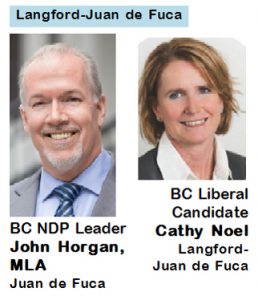 The BC NDP have for decades held Vancouver Island as a stronghold in BC politics. Juan de Fuca MLA John Horgan became their party leader in May 2014.
The BC NDP have for decades held Vancouver Island as a stronghold in BC politics. Juan de Fuca MLA John Horgan became their party leader in May 2014.
On this west side of the island there are two ridings gearing up for a robust race.
In the present Juan de Fuca riding (re-named and reboundaried as Langford-Juan de Fuca for the election and beyond) John Horgan is considered the frontrunner in his home riding. Meanwhile, brought in by the BC Liberals to give Horgan a race is entrepreneurial sport-enthusiast Cathy Noel. She announced her candidacy last fall and has been getting to know various aspects of the riding which includes Langford, Sooke and Juan de Fuca up to Port Renfrew.
 In the present Esquimalt-Royal Roads riding current NDP MLA Maurine Karagianis is retiring from politics. The riding has been renamed and reboundaried as Esquimalt-Metchosin for the 2017 election and beyond. Running for the BC NDP in Esquimalt-Metchosin is long-time social services organizer Mitzi Dean. And as announced just this week, Esquimalt Mayor & CRD Chair Barb Desjardins is now running as the BC Liberal candidate in Esquimalt-Metchosin.
In the present Esquimalt-Royal Roads riding current NDP MLA Maurine Karagianis is retiring from politics. The riding has been renamed and reboundaried as Esquimalt-Metchosin for the 2017 election and beyond. Running for the BC NDP in Esquimalt-Metchosin is long-time social services organizer Mitzi Dean. And as announced just this week, Esquimalt Mayor & CRD Chair Barb Desjardins is now running as the BC Liberal candidate in Esquimalt-Metchosin.
The Writ is scheduled to drop April 11 to officially start the election campaign period. The election is on Tuesday, May 9, with advance polls ahead of that.
The BC NDP is saying it’s time for change. Under the BC Liberals since 2001, the wealth gap has widened under near-relentless privatization. Families have struggled under the burden of increasing rates and fees including for hydro, ferries, and MSP.
The BC Liberals are saying they have strengthened the economy, and provided more job opportunities. They held back on adequate education funding until recently.
Thursday, February 9 ~ REGION. Due to the change in weather, there are multiple areas of flooding and pooling on highways in the South Island area. Drivers are advised to slow down and drive for the conditions of the road. There is the possibility of hydroplaning.
Trees and hydro lines are down in some areas. Road access will not be available for road clearing equipment until downed lines are cleared says Mainroad South Island Contracting.
Wednesday, February 8 ~ South Vancouver Island. Snow is forecasted to develop mid-afternoon today February 8, increasing this evening.
Snowfall over the Pacific Marine Route (including Sooke Road / Hwy 14 / West Coast Road), Lake Cowichan and the Malahat may be quite heavy, as well as featuring some freezing rain.
Mainroad South Island winter operations will be in effect on all highways. That includes additional personnel and equipment. The priority is highways, bus routes and school bus routes as well as main corridor roads. Side roads are done after that. Clearing access for police, fire and ambulance gets priority. Motorists are reminded to drive safely around highway maintenance vehicles.
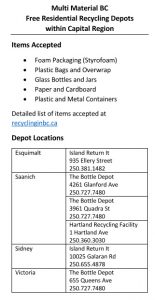 Tuesday, February 7 ~ Greater Victoria area. “Winter conditions on the Saanich Peninsula have made many roads icy and unsafe for recycling trucks to access safely,” says the Capital Regional District (CRD).
Tuesday, February 7 ~ Greater Victoria area. “Winter conditions on the Saanich Peninsula have made many roads icy and unsafe for recycling trucks to access safely,” says the Capital Regional District (CRD).
Blue box collection was cancelled in the Dean Park area of North Saanich yesterday. Recyclables will be picked up instead on Saturday, February 11 when CRD recycling contractor, Emterra Environmental, is planning to collect recyclables (weather permitting).
Residents whose collection was missed on Monday, February 6 but do not live in Dean Park, are advised to hold on to their recyclables until their next collection day or to drop items off at a depot listed here: https://www.crd.bc.ca/docs/default-source/recycling-waste-pdf/mmbcdepotsincapitalregion.pdf
For current updates on blue box service, please contact the CRD Information Line at 250.360.3030 or hotline@crd.bc.ca , or visit the CRD website at www.crd.bc.ca
Tuesday, February 7 ~ A relatively low number of BC Hydro customers –– 683 — are without power at this hour (11:45 am), with most of those in the Duncan and North Cowichan areas, as well as 71 in the Willis Point area near Brentwood Bay.
About five BC Hydro customers are without power in the 2800-block of Sooke River Road as of 11:16 am, with snow storm given as the cause. Crews have been assigned, no arrival time yet given.
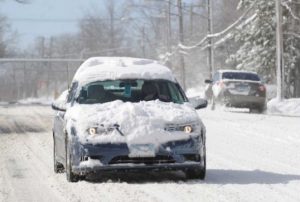 Tuesday, February 7 ~ WEST SHORE of VANCOUVER ISLAND. A few weather-related tips have been issued by Juan de Fuca Emergency Program Coordinator Jeri Grant:
Tuesday, February 7 ~ WEST SHORE of VANCOUVER ISLAND. A few weather-related tips have been issued by Juan de Fuca Emergency Program Coordinator Jeri Grant:
“Make sure your vehicle is completely clear of ice or snow before starting the trip. Flying snow from cars causes accidents.
People really need to slow down when driving in this kind of weather/conditions and be mindful children are not at school and will be out playing in the snow, sometimes on the road.
The trees are weighed down with snow so be prepared for possible power outages, make sure your mobile phone and electronics are fully charged. If you see downed power lines stay back 10 m (30 feet) and call BC Hydro Call 1 800 BCHYDRO (1 800 224 9376) or *HYDRO (*49376) on your mobile.”
 Tuesday, February 7 ~ SOOKE. Schools in Sooke, Colwood, Langford and Metchosin are closed today in School District 62 (SD62) due to challenging road and sidewalk conditions.
Tuesday, February 7 ~ SOOKE. Schools in Sooke, Colwood, Langford and Metchosin are closed today in School District 62 (SD62) due to challenging road and sidewalk conditions.
Recent snowfall has piled up. “All Sooke schools closed due to ice & uncleared sidewalks,” was the official Tweet out from Sooke School District 62 (SD62) today.
Schools are also closed in Saanich (SD63) but are open in Victoria (SD61).
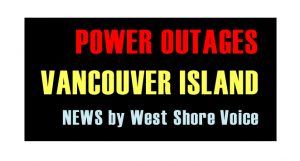 Monday, February 6 ~ SOUTH VANCOUVER ISLAND ~ 5pm. POWER OUTAGE REPORT. While there has been a lot of snow falling steadily for about 24 hours (with the forecast indicating continued overnight snowfall), winds have been very light. Therefore, damage to power lines has been relatively minimal.
Monday, February 6 ~ SOUTH VANCOUVER ISLAND ~ 5pm. POWER OUTAGE REPORT. While there has been a lot of snow falling steadily for about 24 hours (with the forecast indicating continued overnight snowfall), winds have been very light. Therefore, damage to power lines has been relatively minimal.
Overall at this hour (approx 5 pm), 1,345 BC Hydro customers in the South Vancouver Island region are without power, mostly in the Duncan area.
In the Highlands/Saanich area a wire came down around 9:18 am this morning, leaving 205 customers without power all day. Crews are expected on site around 7pm.
In Metchosin, 19 customers have been without power since about 4:15 pm. Crews are expected to arrive around 5:30 pm.
BC Hydro says for all regions (right across BC): “Crews have made progress restoring remaining outages caused by the recent snow storm, including many smaller pocket areas. We’ve encountered widespread damage and access issues, but we’ll continue working into the evening to restore remaining outages tonight. Estimates will be provided as they become available so please check back for the latest updates. Please take caution as weather conditions remain poor. Thanks for your patience.”
![Highway clearing is top priority for road crews. Photo: Feb 6 on WEst Coast Road, [ Copyright 2017 West Shore Voice News]](https://islandsocialtrends.ca/wp-content/uploads/2016/09/2499-WestCoastRd-PhotoCopyright2017-WestShoreVoiceNews-web-200x300.jpg)
The roads contractor announced this afternoon that regular winter crews are on shift 24/7 with additional personnel and equipment brought in as conditions warrant.
This 24/7 winter road crew status will continue “until the conditions change and highways are back to normal”, it was stated in a Mainroad news release.
Motorists and residents are reminded that during a snow event, winter operation services are provided on a priority basis. That means starting with highways, bus routes and school bus routes and main connector roads. The crews begin servicing side roads when the snowfall stops.
‘The public can be assured that in emergency situations where police, fire and ambulance are requiring assistance that our crews will assist them to reach their destination,” says Mainroad in their release.
During winter driving conditions everyone is reminded to drive safely, especially when approaching a highway maintenance vehicle.
“For visibility, It’s a good idea to keep your headlights fully on during the day in snow or rain, which also lights up the tail lights on your vehicle,” says Juan de Fuca Emergency Program coordinator Jeri Grant.
Highway conditions or issues can be reported to the 24-hour communications centre at 1-877-391-7310.
[Photo Copyright 2017 West Shore Voice News: westward view on West Coast Road on Monday, February 6]
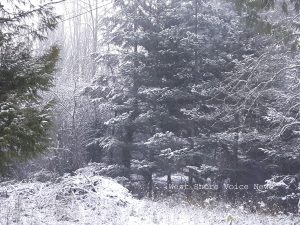 Monday, February 6 ~ WEST SIDE of VANCOUVER ISLAND. Snow continues to fall today on south Vancouver Island (Greater Victoria area), though not nearly as heavily as what the BC mainland Metro Vancouver area is experiencing.
Monday, February 6 ~ WEST SIDE of VANCOUVER ISLAND. Snow continues to fall today on south Vancouver Island (Greater Victoria area), though not nearly as heavily as what the BC mainland Metro Vancouver area is experiencing.
Our current issue of West Shore Voice News carries an editorial about how lucky we are to get “a bit of snow” each winter (as published on page 2, February 3, 2017 issue of West Shore Voice News):
“A little bit of snowfall on this lovely west side of the island this week, and people are rattled enough to change plans. Road safety is of course of the utmost importance, and if people’s driving skills or vehicles are not up to snuff for handling snowy, slippery roads then cancelling or changing travel plans is of course the responsible thing to do.
But it’s a reminder (perhaps an annual one) that we enjoy the blessing of mild weather virtually year-round. Unprepared as most of us are for snow or cold weather produces a chuckle (or chagrin) for most of the rest of Canada where sub-zero temperatures and months of weather-imposed inconvenience is the name of the game every winter.
This region is flocked to by many, but how many truly handle well the cost of it? South Vancouver Island is one of the costliest of Canadian regions. In the island cost-of -living (takes bucks to ship or fly things here) we pay dearly for the breathtaking views, the mostly non-interruptive weather, the long garden/crop growing season, the wonderful seaside air, the opportunity for outdoor recreation on a moment’s notice, and remoteness from the mainstream.
During a lengthy power outage in New Brunswick this past week several people died. Died right there in their homes, from the extended cold (well, mostly from the fumes of generators and gas BBQs that were being inadvisedly used for heating and cooking). If there were ever an extended power outage on this west side of this island in winter, well… it would be mighty uncomfortable, but if prepared, people could survive the temperatures for a week or more if properly sheltered and prepared with their emergency kits and stocked pantries.
Canada is a country of shared values of fairness, compassion, and oh yeah our worldwide reputation to be oh-so-polite. But regional economic disparities are becoming starkly clear — whether as seen in astronomical housing prices in the most sought-after cities (Toronto, Vancouver and Victoria), or evidence of failing infrastructure that challenges the basics of living (as seen in the NB outages). Stabilizing people’s economic well-being and building up community infrastructure hopefully remain as top priorities for leaders across Canada.”
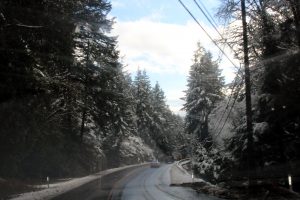 Friday, February 3 ~ 3:40 PM Pacific Time. Environment Canada has issued a snowfall warning for Greater Victoria. Total snowfall amounts of 15 to 25 cm are expected by Saturday morning.
Friday, February 3 ~ 3:40 PM Pacific Time. Environment Canada has issued a snowfall warning for Greater Victoria. Total snowfall amounts of 15 to 25 cm are expected by Saturday morning.
“A low pressure centre is bringing heavy snow to the inner south coast tonight. 5 to 10 cm of snow has fallen since this morning. An additional 5 to 15 cm of snow is expected by early Saturday morning. The snow may become mixed with or change to rain at lower elevations especially near the Strait of Georgia tonight.”
“Be prepared to adjust your driving with changing road conditions. Surfaces such as highways, roads, walkways and parking lots may become difficult to navigate due to accumulating snow.”
Further Environment Canada alerts and forecasts are likely to be issued. To report severe weather, send an email to ec.tempetepacifique-pacificstorm.ec@canada.ca or tweet reports to #BCStorm.
[Photo by West Shore Voice News: Highway 14 after a light snow fall, December 2016]
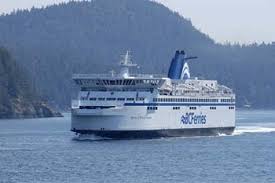 Friday, February 3 ~ VICTORIA. BC Ferries has added sailings during peak travel times on the BC Family Day weekend. Heavy traffic is expected on some sailings between Metro Vancouver and Vancouver Island.
Friday, February 3 ~ VICTORIA. BC Ferries has added sailings during peak travel times on the BC Family Day weekend. Heavy traffic is expected on some sailings between Metro Vancouver and Vancouver Island.
The added sailings are on the Tsawwassen – Swartz Bay and the Departure Bay – Horseshoe Bay routes starting February 10. The extra sailings are:
Tsawwassen – Swartz Bay route:
- Fri Feb 10 – 10:00 am, 2:00 pm and 6:00 pm depart Tsawwassen
- Sat Feb 11 – 8:00 am and 12:00 pm depart Tsawwassen
- Sun Feb 12 – 2:00 pm and 6:00 pm depart Tsawwassen
- Mon Feb 13 – 10:00 am, 2:00 pm, 6:00 pm depart Tsawwassen
- Fri Feb 10 – 12:00 pm and 4:00 pm depart Swartz Bay
- Sat Feb 11 – 10:00 am and 2:00 pm depart Swartz Bay
- Sun Feb 12 – 4:00 pm depart from Swartz Bay
- Mon Feb 13 – 12:00 pm and 4:00 pm depart Swartz Bay
Departure Bay – Horseshoe Bay route:
- Mon Feb 13– 7:00 p.m. depart Departure Bay
- Mon Feb 13 – 9:00 p.m. depart Horseshoe Bay
As usual, travellers are advised to check the website for current conditions.
BC Ferries reminds customers travelling in vehicles with reservations to inform the ticket agent that they have a reservation when they arrive at the ticket booth. This self-identification helps expedite the check-in process.
Tuesday, January 31 ~ VANCOUVER ISLAND. The Vancouver Island Regional Library (VIRL) Board of Trustees held its Annual General Meeting on January 21. Officers and Executive Committee members were elected for 2017. The VIRL board — comprised of elected representatives from 28 member municipalities and 10 regional districts — administers a budget of over $20 million.

Barry Avis (Town of Qualicum Beach) was elected as Board Chair. A VIRL board member since 2015, Avis had also served on the Board and Executive in previous years. Elected as Vice-Chair, Brenda Leigh (Strathcona Regional District) has also served the Board in previous years on both the Executive and as Vice-Chair.

Nine members at large were elected to serve on the Board of Trustees Executive Committee (* = new to the board):
• Gordon Waterman (Village of Gold River)
• Bill Beldessi (North Coast Regional District)
• Howard Houle (Regional District of Nanaimo)
• Kerrie Reay (District of Sooke)
• Diane Brennan (City of Nanaimo)
• Jason Thompson* (Village of Masset)
• Steve Arnett (Town of Ladysmith)
• Ron Kerr (City of Campbell River)
• Tom Duncan (City of Duncan)
In addition to executive member Jason Thompson (Village of Masset) being new to the board, newly appointed board members are: Hugh MacKinnon (Town of Comox), Frank Johnson (Central Coast Regional District), Rod Nichol (Comox Valley Regional District), Heidi Soltau (Regional District of Mount Waddington) and Fred Robertson (District of Port Hardy). More info: www.virl.bc.ca
Thursday, January 26 ~ Free Trade, Rural Canada and How to keep Canada from being Trumped ~ Op Ed submitted by Jan Slomp, President of the National Farmers Union. He farms near Courtenay, BC
 Over the decades since the Canada-US Free Trade Agreement (FTA) and later, NAFTA, was signed, Canadian agriculture has undergone a significant shift. There was once a multitude of diverse local and regional economic drivers, but now we have a “one size fits all” export-driven, low-priced commodity production model. Farm capital needs have sky-rocketed as illustrated by the massive $90 billion farm debt. Off-farm investors control more and more of Canada’s farmland. Production – per farm, per acre and per worker — continues to go up. And that production became increasingly export and transport dependent as NAFTA-driven deregulation accelerated consolidation and transnational ownership of handling and processing facilities. Farmer numbers are ominously declining, yet governments, and most farm commodity groups and agri-business corporations remain euphoric over each signed trade agreement and growing exports.
Over the decades since the Canada-US Free Trade Agreement (FTA) and later, NAFTA, was signed, Canadian agriculture has undergone a significant shift. There was once a multitude of diverse local and regional economic drivers, but now we have a “one size fits all” export-driven, low-priced commodity production model. Farm capital needs have sky-rocketed as illustrated by the massive $90 billion farm debt. Off-farm investors control more and more of Canada’s farmland. Production – per farm, per acre and per worker — continues to go up. And that production became increasingly export and transport dependent as NAFTA-driven deregulation accelerated consolidation and transnational ownership of handling and processing facilities. Farmer numbers are ominously declining, yet governments, and most farm commodity groups and agri-business corporations remain euphoric over each signed trade agreement and growing exports.
What is missing in this picture is a few very sobering facts.
The once mighty farmer cooperative handlers and processors have been dismantled and absorbed into a handful of transnational corporations. Eighty percent of Vancouver’s terminal capacity used to be owned and operated by prairie Pools. Now the private trade owns it all. With the Canadian Wheat Board gone there is no real economic participation by farmers beyond the farm gate, nor any referee to discipline the railroads. Prairie farmers, who once ran the majority of Canada’s grain industry, no longer have a direct connection to the customers and end-users that pay the real market value for their product.
Under NAFTA, Canada’s regulatory system facilitated North American integration of pork and beef slaughter, processing and marketing at the expense of regional and local processors, marketers and the jobs they provided. Despite trade agreements, Canadian exports are still disadvantaged due to transportation costs
Apart from supply management sectors and a brief spike after 2009, overall inflation-adjusted net farm income is dismal. Farm communities across Canada are suffering from chronic economic decline. This was camouflaged by off-farm manufacturing jobs in Central Canada and resource sector jobs in Western Canada, but those jobs are no longer easy to get. The decline of Canada’s rural economy is not often discussed, but four decades of loss — of elevators, rail service, machinery dealerships, manufacturing, processing, input suppliers, essential community services and retailing outlets — has steadily diminished the quality of rural life. Government cutbacks to agricultural research facilities, public plant breeding, the PFRA and government extension services have further aggravated prospects. The decline of rural Canada is stark and given little attention compared to the rural quality of life in other developed countries.
Canada’s growing dependence on food imports is another sobering fact. We can grow many of these products, but have lost our own market because trade agreements help integrated food companies operate across borders, depressing prices for producers while controlling the consumer price. Trade agreements also reward over-processing of foods by substituting basic ingredients with cheaper fats, vegetable oils, soy lecithin, corn starch, fructose and modified milk ingredients, hence North America’s infamous over-consumption of processed foods. If free trade facilitates efficiency, as claimed, why is the spread between prices at the farm gate and the grocery store constantly getting larger?
President Trump vilifies Mexico for the loss of US jobs, but fails to mention the American companies that flocked to the Mexican maquiladoras to take advantage of low labour and environmental standards. NAFTA allowed the US to flood Mexico with its heavily subsidized corn, pork, chicken, beef and dairy, destroying the livelihoods of millions of Mexican farmers. Many subsequently migrated (often illegally) to become super-exploited labour in American fields, factories and meat packing plants.
President Trump will likely find reasons to reject Canadian product coming across the border, so it is very important that Prime Minister Trudeau is prepared for the worst and applies the utmost diplomacy in dealing with the Trump administration.
It is important to understand that NAFTA was never the golden egg its promoters pretended it to be, and neither are the other free trade agreements signed since. NAFTA has caused a lot of damage to the Canadian rural economy and President Trump is likely going to add more trouble. The last thing rural Canada needs is more giveaways to the US in an attempt to persuade the Americans not to back out of the deal. It is time for our Prime Minister to stop trading away the livelihoods of Canadian farmers and to start repairing the damage these deals have done so our domestic and international markets can function in a way that will make farming profitable again.
The decline of the Canadian rural economy must be turned around. If Prime Minister Trudeau wants to prevent the election of a Trump-like Canadian leader in three years he will have to start fixing things in rural Canada. We need an agenda for agriculture that makes rural quality of life and viable family farms the priority.
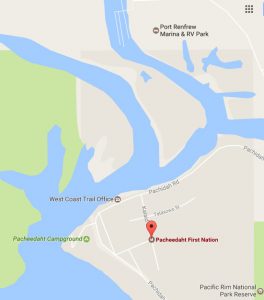 Tuesday, January 17 ~ PORT RENFREW. After three weeks, the identity of a man whose remains were found in a burned vehicle on Pacheedaht First Nation in Port Renfrew has been released. The deceased was Bruce Edward Carlson, age 49.
Tuesday, January 17 ~ PORT RENFREW. After three weeks, the identity of a man whose remains were found in a burned vehicle on Pacheedaht First Nation in Port Renfrew has been released. The deceased was Bruce Edward Carlson, age 49.
Sooke RCMP are calling the death suspicious but have not released details on suspects or whether the case is considered a homicide.
Carlson was a mechanic, carpenter and carver. A memorial service and scattering of Carlson’s ashes is planned for January 28.
According to a report in the Times Colonist, in 2013 Carlson had been sentenced to 12 months in jail for an aggravated sexual assault that took place in Esquimalt. Carlson was ordered to produce his DNA and was on the national sex offender registry.
Carlson’s body had been found in the late morning on Tuesday, December 27, after a person called Sooke RCMP to report a burned grey 2004 Pontiac Grand Am with human remains inside.
Sooke RCMP, the Vancouver Island Integrated Major Crime Unit, the B.C. Coroners Service and a forensic identification team continue to investigate. Anyone with information is asked to call Sooke RCMP or anonymously through Crime Stoppers at 1-800-222-TIPS (8477)
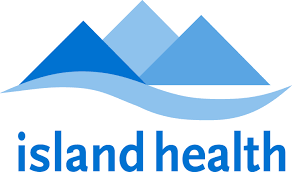 Saturday, January 14 ~ VANCOUVER ISLAND. Island Health is asking Island residents to do their part to ensure they are using Emergency Departments appropriately, particularly at this time of year when patient visits increase due to influenza and other seasonal illnesses.
Saturday, January 14 ~ VANCOUVER ISLAND. Island Health is asking Island residents to do their part to ensure they are using Emergency Departments appropriately, particularly at this time of year when patient visits increase due to influenza and other seasonal illnesses.
“When people use our Emergency Departments wisely it goes a long way in helping dedicated emergency room physicians, nurses and clinical staff provide timely, quality care to patients who truly need emergency care,” said Jeremy Etherington, Executive Vice President and Chief Medical Officer at Island Health.
“People are reminded that emergency rooms triage patients and those in need of emergency or urgent care are seen first, meaning potential longer waits for those with non-emergency or urgent needs, such as a prescription refill.”
While emergencies are unavoidable, some simple steps to avoid unnecessary trips to the hospital emergency room include:
• If you need non-urgent care, book an appointment with your family doctor or visit a walk-in clinic;
• Get a flu shot;
• Wash your hands frequently to avoid getting sick and spreading germs;
• See your doctor before the weekend and/or holidays, if necessary, to avoid long wait-times in the Emergency Department;
• Note the weekend and holiday hours of your local pharmacy/drug store, and ensure your prescriptions are up to date;
• Make sure you have basic pharmaceuticals on hand to control children’s fever and pain;
• Become familiar with walk-in clinic locations in your area, and their hours of operation;
• Wear a seatbelt when operating or riding in a motor vehicle;
• Don’t drink and drive; and
• Wear the right footwear to avoid falling or slipping.
Should you feel you or someone in your care is in need of emergency medical treatment do not hesitate to go to the Emergency Department or call 911. If you are unsure about whether Emergency Department care is needed, call HealthLink BC at 811 to speak to a nurse, 24 hours a day.
 Friday, January 13 ~ VANCOUVER ISLAND. Island Health says there has been an increase in respiratory illness bringing people to hospital on Vancouver Island in recent weeks. “It’s too soon to tell if we have reached the peak of influenza/influenza-like activity,” says Kellie Hudson, Island Health Manager, Media Relations/Issues Management.
Friday, January 13 ~ VANCOUVER ISLAND. Island Health says there has been an increase in respiratory illness bringing people to hospital on Vancouver Island in recent weeks. “It’s too soon to tell if we have reached the peak of influenza/influenza-like activity,” says Kellie Hudson, Island Health Manager, Media Relations/Issues Management.
As of January 10, a total of 181 influenza patients had been diagnosed between September 1, 2016 and January 10, 2017 as were admitted to an Island Health acute care facility (180 influenza A and 1 influenza B). The influenza A strain this year is H3N2. As of January 10, there were still 66 patients in hospital.
“We are aware of five people who have died with confirmed influenza in Island Health facilities,” says Hudson. “While they were diagnosed with influenza, it may not necessarily have been the cause of death.”
As a result of increased patient volumes, Island Health has opened up some overflow areas. The seasonal spike in respiratory illness has also led to a number of surgical postponements last week and into this week as well. Last week, approximately 13 surgeries were postponed across the island due to bed availability, says Island Health. “Surgical postponements are always considered a last resort as we work together to manage the capacity at the site.”
People are asked to wash their hands frequently, sneeze/cough into their sleeve, stay home if ill, and wear a mask if you must be out in public when you have a cold or flu.
Island Health facilities continue to have capacity to respond to critical and emergency cases. No one is turned away, but depending on urgency there may be a longer wait.
 Friday, January 13 ~ VANCOUVER. The BC Centre for Disease Control (BCCDC) is warning the public following a spike in acute gastrointestinal illness associated with the consumption of oysters.
Friday, January 13 ~ VANCOUVER. The BC Centre for Disease Control (BCCDC) is warning the public following a spike in acute gastrointestinal illness associated with the consumption of oysters.
Since early December 2016, over 70 cases of oyster-related illness have been reported to BC health authorities. Illnesses have been reported to Island Health, Vancouver Coastal Health, Fraser Health and First Nations Health Authority. The outbreak is ongoing and more cases are expected.
People who have been ill have reported eating raw oysters or lightly-cooked oysters in restaurants or prepared at home.
“Testing in several of the cases confirmed the presence of norovirus, and we suspect norovirus in the others,” said Dr. Eleni Galanis, epidemiologist at the BCCDC. “In order to kill norovirus and other bugs, people need to cook oysters thoroughly, to an internal temperature of 90 degrees Celsius for 90 seconds.”
Dr. Galanis says oysters can make people sick at any time during the year. While raw oyster consumption during the summer months is linked to an increased risk of illness from “Vibrio” (Vibrio parahaemolyticus), other microorganisms like norovirus can be present all year, The investigation is ongoing.
Anyone becoming ill with diarrhea and vomiting after eating shellfish should call BC HealthLink at 811. If symptoms are severe or persist, they should see their physician.
About Norovirus: www.bccdc.ca/health-info/diseases-conditions/norovirus-norwalk-like-virus | Safe consumption of fish and shellfish: www.bccdc.ca/health-info/food-your-health/fish-shellfish
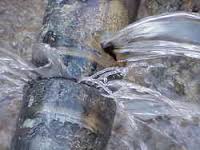 Friday, January 6 ~ SAANICH/VICTORIA. Highway Maintenance Advisory at 7pm this evening.
Friday, January 6 ~ SAANICH/VICTORIA. Highway Maintenance Advisory at 7pm this evening.
Mainroad South Island Contracting is working with the District of Saanich to locate and repair a broken water line in the 5200-block of the Pat Bay Hwy (Hwy 17). That’s south of Saanich, opposite Elk Lake. Hwy 17 enables traffic to/from the peninsula (including airport and ferry terminal).
Fast lane closures will be in effect both North and South bound on Hwy 17 while scheduled maintenancee (6am to 3pm) is undertaken on Saturday, January 7.
“We encourage motorists and residents and the travelling public to avoid the area,” says Mainroad South Island general manager Rick Gill. The Mainroad 24 hr Hotline is 1.877.391.7310. Observations and concerns will be passed along to road crews.
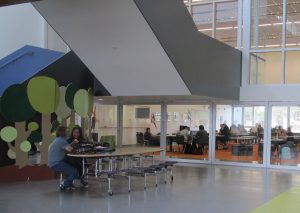
Thursday, January 5 ~ BC. School Districts in British Columbia are in total receiving $50 million to hire more teachers for the remainder of the 2016-2017 school year.
BC Minister of Education Mike Bernier made the announcement today, explaining that it’s up to each school district in discussions with local BC Teachers Federation (BCTF) representatives, to determine what sorts of teacher or staff support hiring will be done with the additional 2016-2017 funds. Province-wide, the $50 million will allow for the hiring of about 1,100 teachers, said Bernier.
Bernier says that the $50 million announced today comes on top of the $5.1 billion already invested in public education in BC. The $50 million is a portion of what will finally be determined in negotiations between the BC Government and BCTF.
Most school districts already know where the needs are, so the additional funds are likely welcome. The funds will be included in the 2017 provincial budget (coming in February), and so will carry forward into hiring considerations for school boards in 2017-2018.
The funds issued at this time are in response to the Supreme Court of Canada decision that reversed a decision made by the BC Government in 2002 that effectively cut back on teachers and funds available for schools to operate over the past 15 years. Since 2002 the continued cutbacks have impacted not only the teachers but the entire delivery of education in BC, as school boards were obliged to find all available funding (including teacher salaries) from per-pupil funding ratio revenues and other miscellaneous revenue sources.
In Sooke School District 62 (SD62) — which serves families and students in Langford, Colwood, Sooke, Highlands, Metchosin, Juan de Fuca and Port Renfrew — about 14 teachers (full time equivalents) will likely be hired pending discussions with the Sooke Teachers Association on January 6, says SD62 Superintendent Jim Cambridge.
Cambridge says that in SD62 the additional funds will probably be used to hire additional secondary school teachers, as well as additional special needs support for the elementary schools. He identified those as top priorities. He also mentioned the options of hiring educational assistants (EAs), additional half-time teachers for full classrooms, teacher-librarians and counsellors.
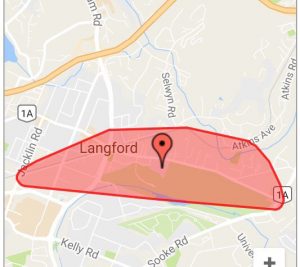 Tuesday, January 3. It’s been windy the past few days on south Vancouver Island, with temperatures at or below zero today. Winds picked up again this evening.
Tuesday, January 3. It’s been windy the past few days on south Vancouver Island, with temperatures at or below zero today. Winds picked up again this evening.
For BC Hydro customers in the utility’s south Vancouver Island region, the impact of weather on power lines presently (9:44 pm) sees 6,590 customers (about 19,000 people) without power. Several of those outages happened in the last one to three hours.
In a section of Colwood/Langford (see map) 1,297 customers have been without power since 8:30 pm.
In Duncan, 493 customers are without power, and the customer outage tally in Central Saanich at this hour is 187 in Central Saanich and the Highlands. The remaining 4,513 affected customers are various of the gulf islands.
Check for updates at www.bchydro.com
 Sunday, January 1, 2017 ~ South VANCOUVER ISLAND. About 1,988 BC Hydro customers in the south Vancouver Island area were without power this afternoon. And while some customers saw power restored, others lost power: still 1,502 had no power as of 11 pm this evening.
Sunday, January 1, 2017 ~ South VANCOUVER ISLAND. About 1,988 BC Hydro customers in the south Vancouver Island area were without power this afternoon. And while some customers saw power restored, others lost power: still 1,502 had no power as of 11 pm this evening.
There was some light snowfall last night, with trees down on wires in some cases. Temperatures have been hovering around zero since last night. Wind speed picked up mid-evening.
AFTERNOON (2pm): Although the weather is calm and skies are bright, around 1:15 pm 673 customers lost power west of Otter Point Road in the Sooke area; also in the Sooke area about 135 customers lost power around Belvista Place. In the Highlands/Langford area 674 customers are without power west of Millstream Road. Power is also out for some customers on Ganges and in Duncan.
EVENING (11pm): At 11 pm tonight there were still 1,502 BC Hydro billing customers without power (that’s about 4,500 people). That includes 115 in Metchosin, a few in Langford, 828 in the West Coast Road area west of Sooke, 107
in the Blythwood/Woodlands area east of Sooke, 384 in the Lochside Drive area of Saanich, and a few on Galiano Island.
Updates: www.bchydro.com
Back to Current Vancouver Island breaking news page | Back to Main page of West Shore Voice News

